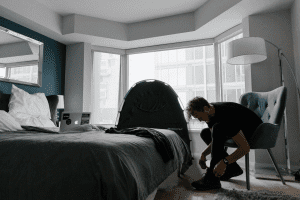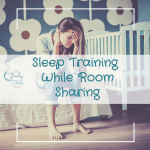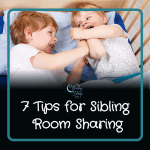
When a family is expecting a new baby, one thing that’s likely high on the to-do list is setting up a nursery. That’s one of the fun parts of being pregnant, after all — buying cute nursery stuff makes up for all the nausea, leg cramps, and constant trips to the bathroom! 😉
What is Room-sharing?
When setting up a nursery for your baby, you’ll probably include a crib in your plans. Whether or not your baby will sleep there, though, is less certain. Plenty of parents prefer keeping their babies (especially newborns) nearby at night. These parents often sleep their babies in bassinets near (or right next to) their own beds. This practice is called room-sharing.
Room-sharing directly affects sleep (both yours and your baby’s). Whether those effects are good or bad (sleep-wise) varies from family to family. Some families find that room-sharing helps everyone sleep better. For others, the opposite is true.
In this article, we’ll explore all the ways (good and bad) that room-sharing affects sleep. However, before we continue, I should note that room-sharing and bed-sharing are not the same thing. Room-sharing is considered safe. Bed-sharing, however, is inherently risky if precautions aren’t taken. We’ll talk primarily about room-sharing in this article.
How Sharing A Room With Your Baby Affects Your Sleep: The Good
Whether your baby sleeps in your room or you sleep in hers, there can be some definite advantages to keeping your little one close by.
- It’s breastfeeding-friendly. This is especially true if you use something like the Arm’s Reach Co-Sleeper. One side drops, allowing the bassinet to be pushed up right next to mom’s side of the bed. When baby is so close at hand, it eliminates the need to get up and walk down the hall, leading to faster nighttime feeds and more sleep for mom.
- You can monitor baby easily. When you and baby share a room, you’re better able to monitor him throughout the night. And this makes a difference: according to the American Academy of Pediatrics, room-sharing can actually help reduce the risk of SIDS. Some parents find that having constant access to their baby throughout the night actually helps them (the parents) sleep better, since there’s no wondering if baby’s too hot or cold, or if baby’s still breathing.
- Nighttime fussiness is quickly resolved. If you’ve read this blog for any length of time, you know by now that hunger isn’t the only reason a baby wakes during the night. Babies wake due to discomfort, or because they need their pacifiers replaced, or simply because they’re going through a sleep regression. And when baby’s nearby, it’s much easier for mom and dad to offer comfort. After all, simply rolling over and replacing baby’s pacifier is easy. Walking across the house to do it (especially if you’re doing it 10 times each night!) is not as easy.
How Sharing A Room With Your Baby Affects Your Sleep: The Not-So-Good
There are plenty of families who find that room-sharing disturbs everyone’s sleep (including baby’s).
- You hear every.single.sound. This was me! When my oldest son was a newborn, he slept in a pack-n-play right next to my bed. That arrangement lasted a grand total of 3 nights. Turns out becoming a mom had given me the hearing of a bat. Every little hiccup or sigh or grunt from my son caused me to wake instantly. It wasn’t until I moved him down the hall that I finally started getting some sleep! Your baby may also hear every single sound you make, which is not so good, if you have a snorer in the family or an early riser.
- You might be tempted to check on baby constantly. This goes right along with the last point. When you hear every sound your baby makes, you end up checking on your baby all the time. (You know — just to make sure that sneeze wasn’t something serious! 😉 ) Not only does this wreak havoc on your own sleep, it can disturb your baby’s, too. Often, those little sighs and grunts happen when baby is fast asleep. When you check on her, you risk actually waking her up.
- Your baby can develop less-than-ideal sleeping habits. This dovetails with the “nighttime fussiness” point in the last section. When you’re room-sharing, it’s easy to stop nighttime crying by offering the breast (after all, how many people can sleep next to an all-night buffet and not eat?), or replacing the pacifier. And that’s a good short-term solution. Everyone will get more sleep on that particular night. But is it a good long-term solution? If that happens every night, your baby runs the risk of developing major sleep associations. And of course, sleep associations ultimately mean less sleep for you and, especially, for your baby.
 Baby bedtimes are very early. Not many adults want to go to bed around 7 or 8 PM. Similarly, some parents need to get up early before the baby to go to the gym, get ready for work, clean, etc. When you’re sharing a room, that can get tricky! Use a SlumberPod® (pictured here) so your baby isn’t disturbed! It’s a perfect solution! And, if you use Coupon Code BABYSLEEPSITE$20, you can get $20 off!
Baby bedtimes are very early. Not many adults want to go to bed around 7 or 8 PM. Similarly, some parents need to get up early before the baby to go to the gym, get ready for work, clean, etc. When you’re sharing a room, that can get tricky! Use a SlumberPod® (pictured here) so your baby isn’t disturbed! It’s a perfect solution! And, if you use Coupon Code BABYSLEEPSITE$20, you can get $20 off!
We’ve said it before, and we’ll say it again… There is no one-size-fits-all solution for baby sleep. Room-sharing is a perfect arrangement for some families. It’s decidedly not for others. We recommend finding a solution that allows everyone in your family to get the rest they need (including you!) That might be room-sharing. And it might be something else.
Nicole’s Note:
“When my youngest was born, we planned on having him in a bassinet in our room. He *hated* it! Never slept even one minute in it. We switched to a Close and Secure Sleeper between us after that and he was so noisy! I would ‘pat him back to sleep’ even when he was sleeping! LOL That was the end of room-sharing for us with that one. 🙂 But, we have many clients who room share successfully. All babies (and situations) are unique!”









